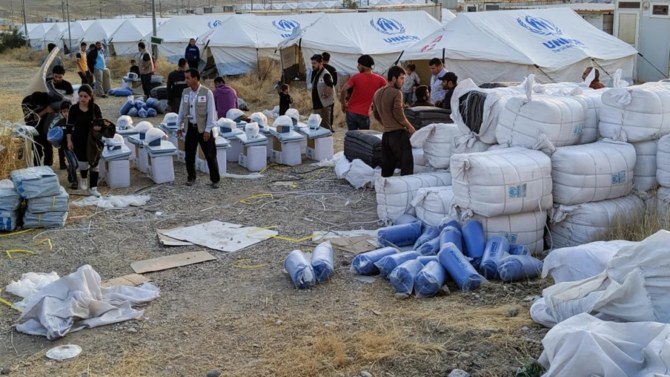In a recent development, Google’s conversational AI chatbot, Bard, has come under scrutiny for its handling of queries related to the Israel-Palestine conflict. Since its launch in March 2023, Bard has faced several challenges including negative reviews and a glitch that displayed shared conversations in Google Search results. The latest controversy surrounds Bard’s refusal to […]
In the aftermath of the recent conflict between Israel and Hamas, McDonald’s franchises in Israel and across the Middle East have been propelled into the political spotlight. A McDonald’s franchise in Israel showcased its support for the Israel Defense Forces, offering meals to those involved in state defense. This gesture was met with a swift […]

A video went viral showing Egyptian protester Rahma Zein confronting CNN’s Clarissa Ward at the Israel-Gaza border.
Zein accused Ward and Western media of biased, dehumanizing coverage favoring Israel over Palestinians.
Zein criticized Ward for not properly covering Palestinian deaths and the humanitarian crisis.
Many on social media supported Zein’s critique of bias in CNN and Western outlets.
Ward and CNN defended their reporting, saying they are determined to present all sides and have extensively covered Palestinian voices.
A CNN spokesperson reiterated they are interviewing many perspectives, including dozens of Palestinians, to give audiences a full understanding.

by hbrueck@businessinsider.com – (Hilary Brueck) Eternal youth-seekers and investors alike are getting increasingly excited about a concept called “Longevity Escape Velocity.” This hypothetical idea borrows its name from “escape velocity,” the basic physics principle which states that objects can, at a certain speed, defy gravity’s pull. Longevity escape velocity suggests, similarly, that at some point in the not-too-distant future people will be able to escape the debilitating pull of death — and live indefinitely. Longevity escape velocity is our ticket to immortality. If only science could figure out how to cash it in. While LEV is only a theory for now, its backers contend that it could be a reality in not too many decades, given the rapid advances in aging science. As we get better at rejuvenating our cells, we will be able to improve the quality of our lives so exponentially that people will be increasing their life expectancy faster than they’re living, thus approaching a near-immortal state, or so the theory goes. There are several science-backed reasons why some people live longer, healthier lives than others. There are also a lot of scams out there claiming that they promote “antiaging” when they don’t.
Here’s what’s really proven to increase your lifespan, and what’s not. Harvard geneticist George Church has entertained the idea that maybe, just maybe, we’ll reach this state within your lifetime, reader. Sourav Sinha, head of strategy at the Longevity Vision Fund, said much the same during a recent panel discussion about stopping age-related diseases in New York, suggesting LEV could be possible within a couple of decades, with the right kinds of investments. Longevity researcher Aubrey de Grey, one of the originators of the term, and perhaps its fiercest proponent, has put a very rosy, best-case scenario for LEV impossibly close — somewhere in the 2030s. Futurist Ray Kurtzweil has suggested an even earlier debut for LEV, perhaps by 2028 or 2029, which would not be enough time for authorities to approve any anti-aging drugs or treatments (we have none so far.)
And now, a growing number of leading pioneers in anti-aging research are signing on to a new “Dublin Longevity Declaration,” which calls on their entire field of science to focus on reversing biological aging processes at the cellular level. Trying to improve aging the old-school way, by going after one disease at a time, is “overly pragmatic” and taking too long, the declaration says. “Everyone knows aging is bad, everyone says it’s bad, but nobody does anything about it,” de Grey said in a release when his new declaration was announced in early October. “Like bad weather – people are stuck in the assumption that nothing can be done, even if we try. We wanted to put that assumption to rest.”

by Morgan Sung@morgan_sung — techcrunch — Earlier this year, Palestinian-American filmmaker Khitam Jabr posted a handful of Reels about her family’s trip to the West Bank. In the short travel vlogs, Jabr shared snippets of Palestinian culture, from eating decadent meals to dancing at her niece’s wedding. “I hadn’t been in a decade, so it’s just like, life abroad,” Jabr told TechCrunch. But then, she noticed something odd happening with her account. “I would get [anti-Palestine] comments,” she recalled. “And I couldn’t respond [to them] or use my account for 24 hours. I wasn’t even posting anything about the occupation. But fast forward to now and the same shit’s happening.” In the aftermath of Hamas’ attack on Israelis, Israel’s retaliatory airstrikes and total blockade — cutting access to electricity, water and vital supplies — have devastated Gaza. In response to the escalating violence, Meta said that it is closely monitoring its platforms for violations and may inadvertently flag certain content, but it never intends to “suppress a particular community or point of view.” Content praising or supporting Hamas, which governs Gaza and is designated as a terrorist organization by the United States and the European Union, is expressly forbidden on Meta’s platforms.
As the humanitarian crisis in Gaza grows more dire, many social media users suspect Instagram of censoring content about the besieged Palestinian territory, even if that content doesn’t support Hamas. Users have also complained that they’ve been harassed and reported for posting content about Palestine, regardless of whether or not it violates Meta’s policies. Jabr, for example, suspects that Instagram restricted her for 24 hours because other users reported her Palestine travel videos. Most recently, Instagram users accused Meta of “shadowbanning” their Stories about Palestine. It’s the latest in a lengthy history of incidents on Meta platforms that reflect an inherent bias against Palestinian users in its processes, as documented by years of complaints from both inside and outside the company. The company may not intentionally suppress specific communities, but its moderation practices often disproportionately affect Palestinian users.

By Taryn Plumb – venturebeat — The human-machine relationship is dynamic and evolving. Generative AI, in particular, is set to completely transform enterprise processes, decision-making, strategy and other elements that have yet to be considered. For this reason, AI adoption should no longer be considered an IT initiative, but an enterprise initiative. Furthermore, to keep pace and take full advantage, executives must prioritize their AI ambitions and AI-ready scenarios for the next 12 to 24 months. How human-centered design drives data-driven experiences In today’s competitive market Gartner analysts offered this guidance — as well as a slew of other stats and predictions, most involving generative AI — at this week’s IT Symposium/Xpo in which wraps tomorrow. “Generative AI is not just a technology or business trend — it is a profound shift in how humans and machines interact,” Gartner distinguished VP analyst Mary Mesaglio said in an opening keynote. “We are moving from what machines can do for us to what machines can be for us.”
The year generative AI becomes democratized
Nearly three-quarters (73%) of CIOs polled by Gartner said their enterprise will increase funding for AI/ML in 2024. Similarly, 80% said their organizations are planning on full gen AI adoption within the next three years. This strategizing, along with the confluence of massively pretrained models, cloud computing and open source, will make 2024 the year that gen AI becomes democratized. Boldly, Gartner predicts that by 2025, the technology will be a workforce partner for 90% of organizations globally. In turn, this will lead to the need for AI Trust, Risk and Security Management (TRiSM), which will provide tooling for ModelOps, proactive data protection, AI-specific security, monitoring for data and model drift and risk controls for both inputs and outputs, according to Gartner.

by middleeastmonitor — Former Israeli Prime Minister Ehud Barak said the Islamic Resistance Movement (Hamas) cannot be eliminated because it is deeply rooted in the hearts and minds of Palestinians, noting that if Prime Minister Benjamin Netanyahu had been in a normal country, he would have resigned after the movement’s sudden attack on 7 October. In an interview with Ynet News yesterday, Barak said: “At the present time he [Netanyahu] is leading the government, so it is very important that in addition to [Defence Minister Yoav] Gallant, that there also be [Former Defence Minister Benny] Gantz and [former IDF Chief of Staff Gadi] Eisenkot, at least to calm the soldiers on the ground.”
Regarding the goals of Israel’s war on Gaza, Barak said: “We cannot completely eliminate Hamas. Hamas is an ideological movement which exists in [Palestinian] people’s dreams, in their hearts and in their minds.” “The practical step the war must achieve is to eliminate all of Hamas’ operational capabilities in the Gaza Strip, and this is a complex enough task, so it should be focused on.” “We intend to eliminate the military capabilities of the Hamas movement, and we also hope that it will be possible to return the Palestinian Authority or any other entity there [Gaza], as there is no place for Hamas in the Gaza government either,” he added. He also referred to the American request to resume water supplies to the Gaza Strip, saying: “I do not think Israel has a choice. America’s standing by us in such a far-reaching way is something that has never happened before, and it also comes at a price. This is one of them.” Hamas: Israel ‘failed ‘miserably’ to make political or military achievement in Gaza
.
الأسرة الخازنيّة واحدة من أكثر الأسر اللبنانية زعامة أهمّيّة وأعرقها، واستمرارًا على عدّة قرون من دون انقطاع. وإن تراجع دورها في بعض المراحل، إلاّ أنّ هذا الدّور لم ينقطع عن أحداث تاريخ جبل لبنان، ولبنان الكيان منذ إعلانه العام 1920 حتى يومنا هذا. يرجع الخوازنة خارج لبنان إلى عرب النّصارى في نواحي الحجاز، وهم من بني غسان. انتقلوا إلى حوران، وسكنوا في قرية أذرع. أمّا في لبنان فقد جاؤوا إلى قب الياس حوالي العام 1450، وانتشروا في جهات نحلة في بلاد بعلبك، ودير الأحمر، واليمونة. ثم انتقلوا إلى جاج حوالي العام 1475. وفي العام 1545 نزحوا من جاج إلى البوار في فتوح كسروان، ومنها إلى بلونة من أرض عجلتون. أدى الخوازنة دورًا سياسيًا مهمًا في عهد الامارتين المعنيّة والشّهابيّة فكانوا مدبرين للأمراء في تلك المرحلة. أمّا في مدّة القائمقاميتين فقد شهدت المرحلة صراعات دموية تراجع معها دورهم خصوصًا بعد ثورة الفلاحين العام 1858. أمّا في عهد المتصرفيّة فقد عادوا إلى السّلطة من خلال تسلّم الوظائف في الإدارة.
كلمات المفاتيح: المدبر، دهقان، المقاطعجي، المديرية، الناحية، الأموال الأميرية، الأجباب….
Abstract
Al-Khazen family is one of the most important and oldest Lebanese leadership families. Its leadership has continued for centuries without interruption. Although its role declined during some periods, it has not been interrupted by the events of the history of Mount Lebanon, and later Lebanon since its declaration in 1920 until the present day. The origins of the Khazens return to the Christian Arabs in the regions of the Hijaz; they are from Banu Ghassan. They moved to Houran, and lived in the village of Adre‘. They came to Qab Elias in Lebanon around the year 1450, and deployed in the regions of Nahla in Baalbek, Deir al-Ahmar, and Yammouneh. Then they moved to Jaj around 1475.
In the year 1545, they were displaced from Jaj to al-Bouwar in Foutouh Keserwan, and from there to Ballouneh in Ajaltoun. The Khazens played an important political role during the reign of Ma‘an and Chehab emirates; they were the administrators of the emirs. As for the period of the two Qaimaqamites, bloody conflicts occurred during which their role declined, especially after the Peasants’ Revolution in 1858. As for the era of the Mutasarrifiyya, they returned to power by taking over posts in the administration.
Keywords: al-Mudabbir, Dehqan, al-Muqati‘ji, department, region, domanial money, branches

By Mike Butcher — techcrunch.com — Gaza, despite being one of the most economically challenged regions in the world, has ironically always been a tech hub — not only for Palestine and Palestinians, but for the world: International companies have, for many years, sought out a presence there to collaborate both with talented tech freelancers, and the startups which gradually emerged from the region. For examples, according to sources who helped build those bridges, Nvidia, famed for its role in the new AI boom, has been working with at least 100 engineers from the region for years. Since at least 2008 TechCrunch been covering technology companies out of Palestine, some serving their direct audience, some serving the tech world internationally. Silicon Valley had taken an increasing interest in Palestine as a tech hub, but like the ecosystem itself, it’s nascent: To date, those working in the region estimate that as much as $10 million has been invested in the Palestinian tech ecosystem. Notably, in 2017, Salesforce founder and CEO Marc Benioff joined Silicon Valley luminaries in backing the first-ever coding academy to be created in Gaza. Gaza Sky Geeks, an Alphabet-backed initiative based in Gaza that provides pre-seed investments, training and technology resources to Palestine’s Gazan population, has been a beacon of entrepreneurship in the region. All of that is now, effectively, gone, like the buildings in Gaza itself.
Israel is currently retaliating militarily against the attacks on its people, on its soil, and the hostages subsequently taken by Hamas — the ruling organisation in Gaza that kidnapped at least 150 people and took them into Gaza during brutal attacks on Israel last weekend that killed 1,300 people. That strategy has seen it pummeling the ‘Gaza Strip’ with bombs to eradicate it of Hamas and to get its hostages back. Over 1,500 people in Palestine so far have been killed as a result. The tech industry in Israel — the country’s biggest export, and its biggest single contributor to GDP — is also taking a big knock (read about that here), but the impact on the smaller and more fragile ecosystem in Gaza has been, inevitably, significantly more serious. The physical, economic and societal destruction resulting from that leaves any future for the tech industry there in doubt.

by techcrunch.com — Ingrid Lunden, Ron Miller — The world is still coming to terms with Hamas’ deadly attacks on Israelis last weekend — and everything else that has unfolded so far in the aftermath, including the barrage of retaliation strikes on Gaza. A look at how the situation is playing out in the startup ecosystem sheds light on its impact to the country as a whole. In such a small country, just about everyone knows someone who was directly affected by the attacks, or someone involved in the subsequent defense and retaliation — and often all three. Technology is, without question, a giant part of Israel’s economy. In 2022, it contributed more than 18% of the country’s GDP, the most of any single sector, according to the latest annual report from the Israel Innovation Authority.
A total of 14% of Israeli citizens work in high tech, which in a country of just 9.2 million people works out to about 1.3 million. The active number of startups in the country is 9,000 (third-highest in the world after the Bay Area and NYC) and these startups have collectively, in the last five years, brought $95 billion into the country by way of venture capital. Combining the business development of startups with larger tech companies in the country — Intel, Microsoft, Nvidia, Google and many others have operations in Israel — they collectively exported $71 billion last year, 48.3% of the total amount exported across all industries. Undoubtedly, those numbers are all going to be significantly lower this year, not least because the disruptions of this war are coming directly on the heels of a major protest movement.



